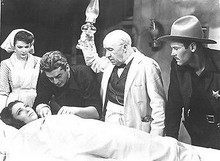 Loading... Please wait...
Loading... Please wait...New Products
Our Newsletter
Product Description
My Darling Clementine (1946)
Director:
John FordWriters:
Samuel G. Engel (screen play), Winston Miller(screen play)Stars:
Henry Fonda, Linda Darnell, Victor Mature
One of the greatest movie Westerns, John Ford's My Darling Clementine is hardly the most accurate film version of the Wyatt Earp legend, but it is still one of the most entertaining. Henry Fondastars as former lawman Wyatt Earp, who, after cleaning up Dodge City, arrives in the outskirts of Tombstone with his brothers Morgan (Ward Bond), Virgil (Tim Holt), and James (Don Garner), planning to sell their cattle and settle down as gentlemen farmers. Yet Wyatt, disgusted by crime and cattle rustling, eventually agrees to take the marshalling job until he can gather enough evidence to bring to justice the scurrilous Clanton clan, headed by smooth-talking but shifty-eyed Old Man Clanton (Walter Brennan). Almost immediately, Wyatt runs afoul of consumptive, self-hating gambling boss Doc Holliday (Victor Mature, in perhaps his best performance). When Doc's erstwhile sweetheart, Clementine (Cathy Downs) comes to town, Earp is immediately smitten. However, Doc himself is now involved with saloon gal Chihauhua (Linda Darnell). The tensions among Wyatt, Doc, Clementine, and Chihauhua wax and wane throughout most of the film, leading to the legendary gunfight at the OK Corral, with Wyatt and Doc fighting side-by-side against the despicable Clantons. Its powerful storyline and full-blooded characterizations aside, My Darling Clementine is most entertaining during those little "humanizing" moments common to Ford's films, notably Wyatt's impromptu "balancing act" while seated on the porch of the Tombstone hotel, and Wyatt's and Clementine's dance on the occasion of the town's church-raising. Based on Stuart N. Lake's novel Wyatt Earp, Frontier Marshall (previously filmed twice by Fox), the screenplay is full of wonderful dialogue, the best of which is the brief, philosophical exchange about women between Earp and Mac the bartender (J. Farrell MacDonald). The movie also features crisp, evocative black-and-white photography by Joseph MacDonald. Producer (Daryl F. Zanuck) was displeased with Ford's original cut and the film went through several re-shoots and re-edits before its general release in November of 1946.
Here is the link to the movie at the Internet Movie database: http://www.imdb.com/title/tt0038762/?ref_=fn_al_tt_1
Currency Converter
Choose a currency below to display product prices in the selected currency.
















